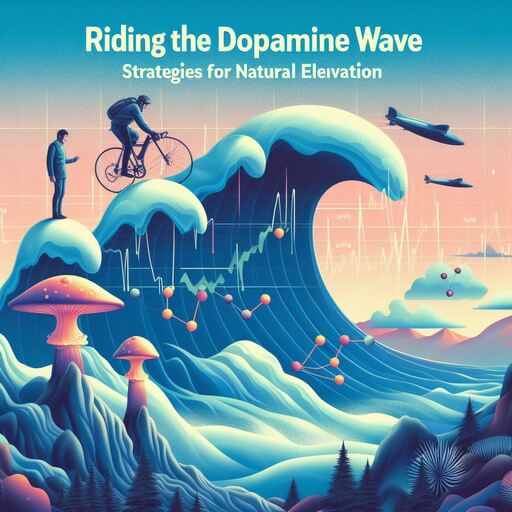Strategies for Natural Elevation
Strategies for Natural Elevation
Riding the Dopamine Wave: Strategies for Natural Elevation
In the relentless pursuit of happiness and well-being, dopamine stands out as a beacon of hope. Often referred to as the “feel-good” neurotransmitter, dopamine is a key player in our brain’s reward system, involved in driving our most intricate behaviors and emotions. Understanding how to naturally elevate dopamine levels can lead to improved mental health, heightened motivation, and a deeper sense of satisfaction. This article delves into strategies for harnessing the power of dopamine through natural means, offering a sustainable path to enhanced well-being.
Understanding Dopamine
Strategies for Natural Elevation
Before exploring how to increase dopamine naturally, it’s essential to understand what it is and how it functions. Dopamine is a neurotransmitter that communicates with the brain’s reward center. It is released during pleasurable situations and stimulates feelings of enjoyment and reinforcement, motivating us to proactively perform those activities again. Low levels of dopamine are linked with reduced motivation, depression, and other emotional challenges.
Natural Strategies to Boost Dopamine
Strategies for Natural Elevation
- Optimize Your Diet
Nutrition plays a crucial role in the production of dopamine. Certain foods are not only nutritious but also aid in boosting dopamine levels. Here are some dietary considerations:
- Protein-Rich Foods: Foods high in protein contain tyrosine, an amino acid that is pivotal in the production of dopamine. Examples include beef, eggs, fish, poultry, and soy products.
- Fruits and Vegetables: Bananas, avocados, and dark leafy greens like spinach are excellent for dopamine production.
- Nuts and Seeds: Almonds, sesame seeds, and pumpkin seeds can boost dopamine levels, thanks to their healthy fats and protein.
- Probiotics: Fermented foods like yogurt, kefir, and sauerkraut support gut health, which is linked to mood regulation through the gut-brain axis.
- Regular Physical Activity
Exercise is a potent dopamine booster. Physical activity increases blood calcium, which stimulates dopamine release. Furthermore, it promotes the production of new brain cells, enhances neural connections, and provides an immediate dopamine spike. The key is consistency and enjoyment, as pleasure derived from activities sustains dopamine release.
- Mindful Meditation
Meditation can increase dopamine naturally, which contributes to enhanced focus, higher mood, and a better stress response. Mindfulness meditation, in particular, has been shown to increase dopamine, leading to greater feelings of happiness and tranquility.
- Adequate Sleep
Sleep and dopamine levels are closely intertwined. Lack of sleep can deplete dopamine receptors, leading to lower concentration and reduced coordination. Adults should aim for 7-9 hours of quality sleep per night to maintain optimal dopamine sensitivity.
- Sunlight Exposure
Regular exposure to sunlight can increase the number of dopamine receptors and boost dopamine release. Aim for at least 20-30 minutes of sunlight exposure daily. This not only enhances vitamin D levels but also helps maintain circadian rhythms that influence overall well-being.
- Listening to Music
Music is a powerful emotional stimulator that can trigger dopamine release. Listening to music you enjoy can create ‘chills’ that are actually caused by dopamine release, reflecting a peak emotional response.
- Creative Activities
Engaging in creative work can also act as a dopamine booster. Whether it’s painting, writing, crafting, or dancing, creative activities make us feel good, which is often the result of dopamine release.
- Supplements and Herbs
Several supplements and herbs can help increase dopamine levels:
- Curcumin, found in turmeric, effectively increases dopamine in the brain.
- Ginkgo biloba is known to boost dopamine levels and enhance cognitive function.
- L-theanine, an amino acid found in tea, can increase neurotransmitters in the brain, including dopamine.
Implementing Dopamine-Boosting Strategies
Incorporating these strategies requires consistency and mindfulness. Start by integrating one or two strategies into your daily routine, like adjusting your diet and incorporating regular physical activity. Gradually, introduce additional practices such as meditation and creative hobbies. It’s also important to note that while these strategies can enhance dopamine levels, they are part of a holistic approach to health and well-being.
Strategies for Natural Elevation
Challenges and Considerations
While natural strategies for increasing dopamine are beneficial, they’re not a cure-all. Individuals with severe dopamine deficiency symptoms, such as those associated with depression or Parkinson’s disease, should consult healthcare professionals. These conditions often require medical treatment and should not rely solely on lifestyle changes.
Strategies for Natural Elevation
Conclusion
Riding the dopamine wave through natural strategies can lead to substantial improvements in mental health, motivation, and overall life satisfaction. By understanding the role of dopamine and implementing lifestyle adjustments that enhance its production, individuals can achieve a higher state of well-being and truly enjoy the ride on the wave of this powerful neurotransmitter.
